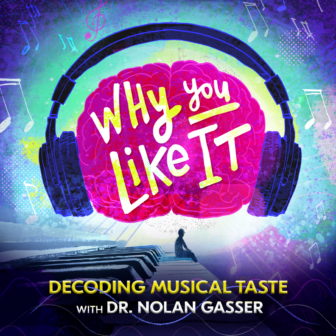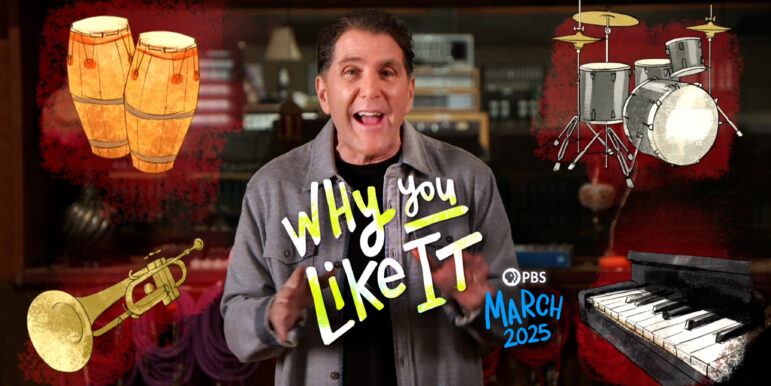Your favorite songs will heal you
SPONSORED
By Dr. Nolan Gasser, Host of PBS’ Why You Like It: Decoding Musical Taste


Of the myriad topics I get to consider in my obsessive research into the alchemy of our musical taste, the most fascinating is also the most rewarding: how our love of music can not only give us pleasure but can make us healthier and happier! Indeed, as much as anything else, music is designed to bring us happiness. Evolution has granted to our brain a built-in capacity for music to generate deep emotion, especially positive emotions—tied to our relationships, our memories, and our very identity. In short, and as I say in my forthcoming PBS show, Why You Like It: we all love music because music is good for us! As such, we all have good incentive to not only listen to more music, but to actively work to expand and, as I say, to empower our musical taste.
The power of music to elicit and alter our emotions has been strongly promoted going back centuries, such as in ancient Greece. Plato, for example, strongly advised against the singing of certain types of melodic scales given their potential harmful impact on one’s character: “The Mixolydian (scale),” he wrote, “and the intense Lydian (scale), and others similar to them . . . we must do away with them by virtue of their ability to arouse sadness, sloth, and softness in both women and men.” Others, like the Dorian scale, by contrast, he advocated by virtue of its ability to “imitate the utterances and the accents of a brave man who is engaged in warfare.” Similar expressions of music’s tremendous power over our emotional nature can be found in the writings of ancient Japan, India, and Persia.

But how exactly does music intersect with emotion? Among the ways that sages and scholars have posited include its ability to influence our mood, regulate our emotional state, relieve stress, adjust our mind-set or behavior, impact our sexual arousal, alter our state of consciousness, increase or lessen our socialization, and affect our mental, physical, and psychological well-being. Not a bad list!
And yet the dimension that has received the greatest attention in recent years involves the benefits that music can afford the physical body—especially when things go wrong. This is the realm of music therapy. As the famed neurologist Oliver Sacks put it: “Our auditory systems, our nervous systems, are tuned for music.” In discussing the potential for people with dementia, for example, Sacks argued that music therapy can extend beyond an ability to improve motor or speech disorders, to also address “the emotions, cognitive powers, thoughts, and memories, the surviving ‘self’ of the patient, to stimulate these and bring them to the fore.”

The potential for music to serve as a healing agent no doubt goes back to the dawn of our species, and certainly to the dawn of civilization, as demonstrated by paintings of harp-playing priests healing the sick in ancient Mesopotamia, dating back to 4000 BCE. During the Middle Ages, music listening was directly aligned with maintaining a healthy body via the great philosopher Boethius’ concept of “musica humana”, given its power to connect the functions of the flesh with the actions of the soul and spirit. Such spiritual (non-empirical) correlations of music and wellness continued into the 19th century; for example, music was often used as an alternate to bloodletting in resolving the dangerous illness of “melancholia.”
Since the 1950s, scientific rigor has been employed to demonstrate exactly how music intersects with healing of the body, giving rise to the practical field of music therapy. In the 70+ years since, music has been corroborated to help in a therapeutic capacity for a variety of conditions, including cancer and heart disease. It can also aid Alzheimer’s, dementia, and stroke patients in improving their cognition and memory retrieval. More broadly, moreover, music therapy has been shown to lower anxiety during medical treatment, and to reduce the pain of patients to a degree equal to taking 10 milligrams of morphine.

But it is not just in helping the body when something goes wrong that music offers salutary benefits. The positive emotional impetus that music offers us—for example, in the satisfaction we get in predicting a musical beat or melodic passage, means that simply listening to music benefits us. It can lower our heart rate and blood pressure. Another benefit is music’s ability to help with our “subjective well-being”—defined as “an individual’s perception of the quality of their own life.” In practical terms, this means that listening to the music we love can help us to more successfully handle stressful situations and make better decisions. Add to that the power of music to improve our capacity to learn and our social skills (not least when we’re young). It is a no-brainer to make music an active and deliberate part of our daily lives; music is, as I say, the gift that keeps on giving!
Yet to maximize the potential pleasure as well as the potential benefits of music—to trigger the blessed release of neurochemicals that brings “chills” and other good things—we must actively engage with music that we truly love; this is how we empower our musical taste. To be sure, listening to music as background is fine and good. But if you can increase your opportunities to engage with music that you love—especially in our rushed, over-digitalized, and socially fragmented world, I promise you that your ears, cells, body, soul, and spirit will thank you!
Dr. Nolan Gasser is a composer, pianist, author, and musicologist, best known as the architect of Pandora Radio’s Music Genome Project. He is the author of the best-selling book Why You Like It: The Science & Culture of Musical Taste, which explores the psychology and sociology of musical preference. His forthcoming PBS special, Why You Like It: Decoding Musical Taste, airing in March 2025, brings these insights to life through live performances, animations, and an interactive app. Gasser’s original compositions include Secret Garden (SF Opera) and Cosmic Reflection (Baltimore Symphony), and his world-fusion band, The Mighty Mighty, will release their debut album alongside the PBS special. Beyond music, he co-founded Katch Data, a leading “genomic” data company working with major media players like Meta and Paramount to predict consumer taste. He also consults on music AI projects, including with Google DeepMind.
For further information please contact Deborah Radel at DRPR, deborah@drpr.us


